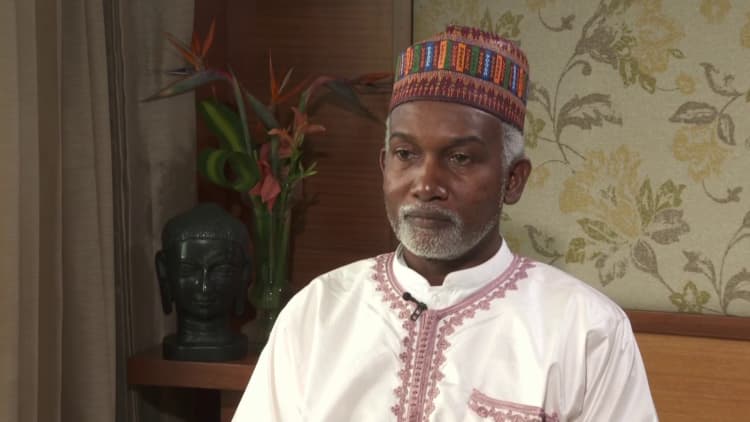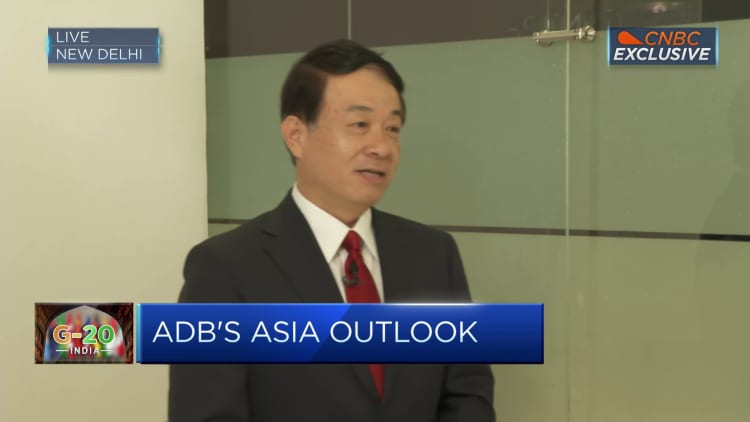India’s Prime Minister Narendra Modi (2L) addresses the opening session of the G20 Leaders’ Summit at the Bharat Mandapam in New Delhi on September 9, 2023.
Ludovic Marin | Afp | Getty Images
NEW DELHI — The Group of 20 nations on Saturday overcame differences in references to the war in Ukraine, reaching a consensus on a joint declaration that paves the way for frameworks on debt resolution, and country-specific climate financing solutions among other pledges aimed at enhancing development in the Global South.
In an 83-paragraph joint communique aimed at deepening the integration of the needs of developing economies into the multilateral forum’s agenda, the Delhi declaration omitted words from the last year’s statement that overtly condemned Russian aggression against Ukraine — instead highlighting the human suffering and other negative impacts of the war in Ukraine that have complicated recovery efforts in the aftermath of the Covid-19 pandemic.
The wording of “most members strongly condemned the war” was among the changes. Instead, G20 member states agreed to lean on the tenets of the United Nations charter on territorial integrity and against the use of force.
“Considerable time was spent — especially in the last few days — in regard to geopolitical issues, which really centered around the war in Ukraine,” Indian Foreign Minister Subrahmanyam Jaishankar said Saturday at a press conference following Prime Minister Narendra Modi’s initial announcement of the consensus on a joint declaration.

“Everybody helped, because everybody came together for the consensus, but the emerging markets took a particular lead on this and many of us have a strong history of working together,” Jaishankar added.
This accomplishment underscores India’s diplomatic clout at a time when global alliances are shifting. With the Russian and Chinese heads of state conspicuously absent from this year’s leaders’ summit, Modi has been keen to position India as a key global player advocating the interests of the Global South, while serving as an interlocutor with the developed nations.
Yet, there were some fears Delhi negotiators and diplomats might not have been able to broker a consensus at this year’s meeting. Fierce objections by the Russians and Chinese to references to the ongoing war in Ukraine have hobbled India’s efforts at fostering consensus in the major discussion tracks in the course of its year-long presidency.
Oleg Nikolenko, a spokesperson for the Ukraine’s foreign ministry, criticized the compromise in a Facebook post, saying the G20 joint communique was “nothing to be proud of.”
‘Cascading challenges’
In the Delhi declaration, G20 leaders called for the “full, timely and effective implementation” of the Black Sea grain deal “to ensure the immediate and unimpeded deliveries of grain, foodstuffs, and fertilizers/inputs from the Russian Federation and Ukraine.”
Russia unilaterally withdrew from the deal — brokered between Turkey, the United Nations, Ukraine and Russia in July 2022 — that helped ease the Kremlin’s naval blockade in the Black Sea and established a humanitarian corridor for agricultural exports.
The agreement had facilitated the transport of 725,167 tons of wheat for the World Food Program to some of the world’s most food-insecure countries, including Afghanistan, Ethiopia, Somalia, Sudan and Yemen.
The ensuing food insecurity from the festering Ukraine crisis added to the many challenges that have afflicted the world in the last few years, complicating policy efforts to recover from the adverse economic and social impact of the Covid-19 pandemic.

“Years of cascading challenges and crises have reversed gains in the 2030 Agenda and its Sustainable Development Goals,” G20 leaders said in the Delhi declaration, as they pledged to protect the most vulnerable in the world by promoting equitable growth and enhancing macroeconomic and financial stability.
To further cement that goal, India also fostered the admission of the African Union as the second regional grouping to gain full G20 membership after the European Union.
Other than the mitigation of the impact on geopolitics of food and energy security, the Delhi declaration also included the expediting of climate action, the provision of more loans to developing nations by multilateral institutions and restructuring the world’s debt architecture as well as an international framework for cryptocurrencies.
Leveraging the G20
Leaders of India, Brazil, South Africa and the U.S. met on the margins of the G20 summit, pledging “to build on the historic progress of India’s G20 presidency to address global challenges” in partnership with the World Bank in building “better, bigger, and more effective” multilateral development banks.
These pledges build on a G20 agreement to expand lending by multilateral institutions such as the World Bank and the International Monetary Fund. Such steps could yield as much as $200 billion in extra funding in the next decade, Indian Finance Minister Nirmala Sitharaman said Saturday at the press conference explaining the Delhi declaration.

These four countries represent the current and the next three G20 member states that are due to hold the rotating presidency of the multilateral forum founded in 1999 to tackle the issues that afflict the global economy.
In the flurry of activities independent of the auspices of the main G20 summit, Modi and U.S President Joe Biden underscored not only the deepening partnership between their two countries, but also their urgency and resolve in persuading the world they represent a more viable strategic proposition in facilitating the developmental needs of the Global South.
Biden and Modi’s second bilateral meeting in less than six months on the eve of the two-day G20 leaders’ summit kicked off a series of other deals and announcements — a stark contrast, in particular, to Chinese President Xi Jinping’s decision to stay away from this summit.
Modi and Biden were joined by leaders from Argentina, Brazil, Italy, Mauritius, and the United Arab Emirates in launching the Global Biofuels Alliance, a partnership aimed at deploying greener fuels around the world that help meet decarbonization goals.

The two leaders also announced a plan to develop a network of railways and sea routes that will connect India, the European Union and Middle Eastern countries such as Israel, Jordan, Saudi Arabia and the United Arab Emirates in “a transformative regional investment.”
This seeks to not only counter China’s influence in the energy-rich Middle East, but also its Belt and Road global infrastructure initiative.
Biden also announced a partnership with the European Union in a new greenfield rail line expansion to develop the Lobito Corridor connecting the southern part of the Democratic Republic of the Congo and northwestern Zambia to regional and global trade markets via the port of Lobito in Angola.
“This is a big deal, this is a real big deal,” Biden said Saturday. “The world stands at an inflection point in history, a point where decisions we make today affect the course of all our futures for decades to come.”














